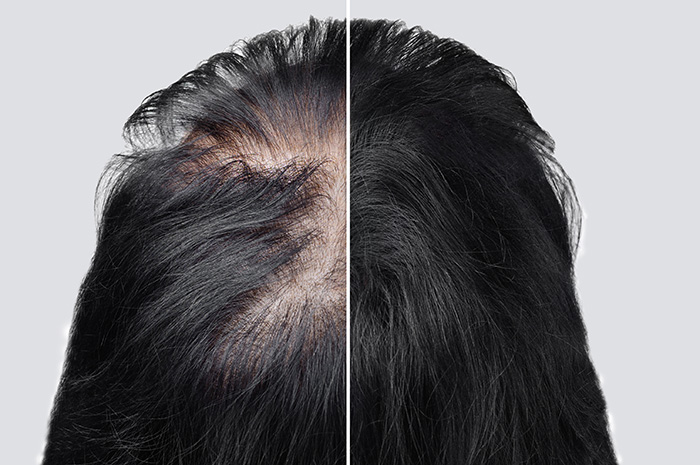Stress-Induced Hair Loss: It Can Happen

Key Takeaways:
- Emotional and physical stress can trigger changes in the hair-growth cycle, leading to temporary hair loss months later.
- Such stressors can include illness, injury, high fever, prolonged sleeplessness, drugs, surgery and trauma.
- There is no cure for this hair loss, but over-the-counter and prescription medication can stimulate new hair growth.
Losing your hair can be confusing, upsetting and even emotionally traumatic. This is only worsened by the fact that stress, depression, isolation and illness can trigger premature or accelerated hair loss or increased hair shedding.
The relationship between trauma, stress and hair loss
Physical and psychological stress are known causes of hair shedding and loss. This kind of hair loss, called telogen effluvium, is part of the body’s response to a traumatic event, such as a period of intense psychological stress, prolonged sleeplessness, change of diet, infection, high fever, a car accident, surgery, or other stressors to the body and mind like hormonal or medication changes. It’s not typically a sign of premature balding but can initiate or accelerate baldness.
Hairs follow a life cycle with phases. After a period of intense or prolonged stress, a large number of hairs in the growing phase (anagen phase) can suddenly enter the resting phase (telogen phase). While resting, these hairs stop growing for one to three months. This change isn’t noticeable. But, when the affected hairs re-enter the growth phase, the hairs that were in the resting phase are pushed out of the follicles. This is when you’ll see noticeable hair shedding.
Because one to three months passes between the stressful incident and the hair loss, many people don’t connect the two experiences.
Hair loss following illness
During the COVID-19 pandemic, many people reported hair loss following infection.
“This type of hair loss doesn’t start at the time of the infection,” says Antonella Tosti, M.D., a dermatologist with the University of Miami Health System. “Patients start to notice it months later.” In 2020, Dr. Tosti said, “Most of the patients I saw lost 50 to 70% of their hair following COVID-19 infection.”
This type of hair loss is also seen in people who’ve recovered from the seasonal flu, bacterial infections and other illnesses that cause high fever, fatigue and sleeplessness.
Many people who managed to get through the COVID-19 pandemic without getting sick also reported hair loss. Dermatologists and researchers concluded that the immense social, professional, and financial pressures of the pandemic caused stress-induced hair loss in some people.
Can stress-induced hair loss be treated or reversed?
For most people suffering from telogen effluvium, the hair regrows – without treatment – within six months after the physical or psychological stress passes.
“However, for those predisposed to baldness, the hair might grow back thinner than before,” Dr. Tosti says. “Those with ongoing intense stress may also experience long-term or worsening hair shedding over time.”
There isn’t a cure nor treatment for telogen effluvium specifically. “But, there are treatments to prevent hair thinning after telogen effluvium resolves,” Dr. Tosti says. “I think that patients with severe hair loss or decreased hair density should consult a dermatologist to decide if they need to start treatment.”
Over-the-counter and prescription medications containing minoxidil may stimulate the growth of new hair and prevent new hair from growing back thinner.
Get your stress under control.
The best advice for those experiencing telogen effluvium is to identify causes of stress and learn ways to manage your responses to them.
You may think you’re not stressed out, but people experience and express stress in various ways. It can look like anger, seclusion, exhaustion/fatigue or an intense focus on a distraction like work, exercise or video games.
You may not be able to avoid stressful triggers — whether it be a high-pressure job, a severe injury, illness, or a combative family member — but you can make an effort to change your physical and emotional reactions to it.
Ways to manage your body’s response to stress:
- Increase physical activity.
- Speak openly with friends and family.
- Spend time outdoors.
- Eat a well-balanced diet.
- Avoid excessive alcohol and drug use.
- Get sufficient sleep.
If you need additional resources to address your stress, anxiety, and/or depression, speak with your primary care physician. You may be referred to a provider with expertise related to the source of your stress.
References
“Prevalence of telogen effluvium hair loss in COVID-19 patients and its relationship with disease severity” – Journal of Medicine and Life, 2022: https://pmc.ncbi.nlm.nih.gov/articles/PMC9262270/#S5
Dana Kantrowitz is a contributing writer for UMiami Health News.

Last reviewed in April 2025 by Antonella Tosti, M.D., a dermatologist with the University of Miami Health System.
Originally published on: August 18, 2020
Tags: COVID-19, Dr. Antonella Tosti, hair loss, how stress affects hair growth, stress, telogen effluvium, treatments for stress-induced hair loss
